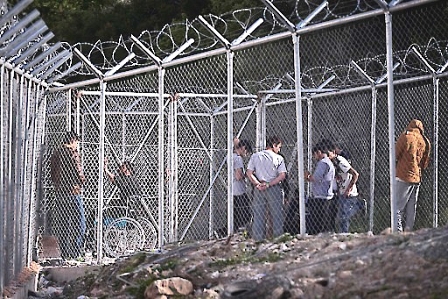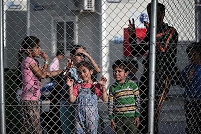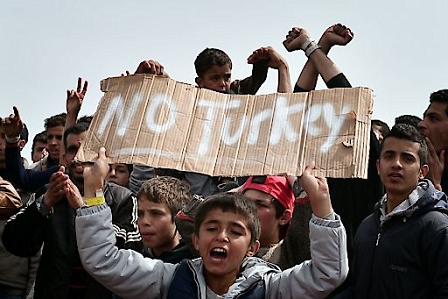Erstellt am: 12. 4. 2016 - 15:37 Uhr
Inside the Vial detention camp
FM4 Reality Check
Hear the programme in the FM4 Player or subscribe to the podcast and get the whole programme after the show
Conditions in the detention camps in Greece where refugees and migrants are being held are more like a prisoner of war camp than a holding facility, and huge violations of human rights are taking place. That's the bleak conclusion of researchers from Human Rights Watch who have been visiting the camps on the islands of Lesbos and Chios.
The director of HRW Germany, Wenzel Michalski, told Joanna Bostock what he saw:
WM: Chios is totally overcrowded. You have a lot of people from different nationalities squeezed up in a tiny room, there’s not enough sanitation, there’s not enough fresh water, there’s almost no medical help, there are not enough doctors, there is no lawyer. The lawyer left on the day we arrived, she left for good, she had a new job, and that means no one who’s seeking asylum gets any legal help..
JB: Is this an open space outside with a fence? Is it a house, what kind of building is it? Where did they actually put this centre?
WM: The camp itself is nestled in a very beautiful landscape. This is very bizarre, because inside the centre the conditions are really horrible. The camp is surrounded by a metal fence, topped with barbed wire. There are gates which are guarded by police officers.

AFP PHOTO / LOUISA GOULIAMAKI
They shut them and the lock them, and they open them when people want to go in [or out]. Usually it is people who ask to leave the camp to go to a big former factory where they are being registered. Sometimes they let visitors in, like us, which is very rarely. So, these people are locked up, they are in detention, and the whole camp looks much more like a prisoner of war camp than a facility for people who are refugees or migrants, who haven’t done anything, they are not criminals, but there they are treated like criminals, and it felt as if they are being treated like criminals. The food is not very good, it’s mostly pasta and potatoes. The sanitation also is horrible. The people inside the camps complain about cold water, not enough hot water to shower, which is not great for little children.
JB: And tents? They are living in tents?

AFP PHOTO / LOUISA GOULIAMAKI
WM: No, they live in containers which are 30 square metres. We spoke to one family, there are 11 members on 30 square metres, eating, sleeping, living in there. They were there already for a fortnight. It’s terrible. There’s not enough space for them to walk around, to get some fresh air. There are some spaces between the containers, but you can’t do anything. You can’t go for a walk, you can’t do any exercise. Also women and men are not really separated, and women who travel alone (we talked to many!) with children – they feel scared of men inside these facilities, and there is an aggressive atmosphere because there are so many people in such little space. There were clashes between Afghans and Syrians for example, which people were describing to us. A lot of people were traumatised by this violence.
JB: So, these people come for a variety of different countries, what’s the outlook for the people in this camp? Are some of them being deported back to Turkey under the EU-Turkey deal?
WM: There have been people deported back to Turkey, and we talked to people whose friends were deported. This happened in a very disturbing way: they were asked to come outside of the camp and they thought they would be registered; but instead they were put in buses.

AFP / LOUISA GOULIAMAKI
When they said they didn’t want to [get on the] buses, there were police vans with wired windows and if they said they didn’t want to go they were handcuffed and pushed in. And they just disappeared – without their backpacks, without their money without their medicine. We were shown medicine for people who had problems with their stomach or with their back. Their friends followed them on their mobile phones, and they said “we are in Turkey now” and in Turkey their mobile phones were taken from them and since then these people have disappeared.
We also know about at least 13 people who had applied for asylum and mistakenly were being deported to Turkey (in that case it was from Lesbos). So these deportations are arbitrary and they are not at all organised: people don’t know before that they are being deported and it’s very deceptive.
JB: Is this something that Human Rights Watch is going to raise with the Turkish government, with the European Union governments and with the European Commission?
WM: Yes. We will raise our concerns with the European Commission, with the Turkish government and also with the Greek government. And with Frontex, because what we’ve seen is a huge violation of human rights and it’s really hard to believe that this is happening within the European Union.
FM4 Reality Check
Monday to Friday from 12.00 to 14.00, Saturday from 12.00 to 13.00, and after the show via Podcast or fm4.orf.at/realitycheck.



